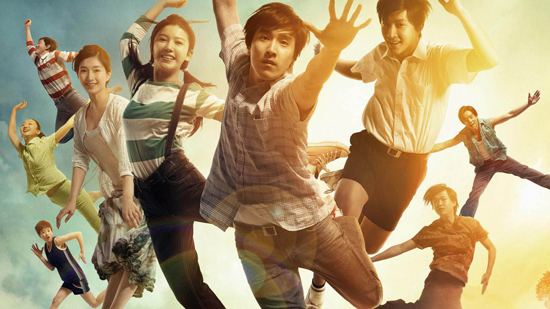Salute to a Bygone Age
The 2011 Taiwan film You Are the Apple of My Eye turned out to be a whopping success among mainland viewers, ushering a spate of youth films in the years following. The top three this year are So Young, American Dreams in China and Tiny Times, with box-office revenues of RMB 709, RMB 534 and RMB 468 million, respectively.
So Young is directed by actress Zhao Wei, during her final year of a master’s degree in film directing. A retrospective on her own generation, themed on campus life of 1990s university students, it mourns their imperfect but flamboyant love affairs that finally drown in real world concerns and calculations. The film represents the director’s meditation and dissection of a slice of a past she was a part of.
So Young in one way or another is relevant to those generations before or after hers, spanning those born post-1950 to post-1990. The IC-card phone booth outside the dormitory building, the pop-star posters on the walls of cramped dorm rooms, the bunk beds, John Gray’s bestseller Men Are from Mars, Women Are from Venus, the churning and squeaking electric fans, and the beeping of pagers in class under a teacher’s angry glare... all hold keys to many a viewer’s subconscious.
 |
| So Young |
Zhao Wei, born in 1976, is one of the post-1970s, a transitional generation in the shadow of the nationalistic 1960s and the individualistic ’80s. Despite palpable candor and star power, she still fails to produce a movie as innocent and unadulterated as she had desired. Several brands from later years anachronistically feature in the film, apparently as forms of product placement. The work was threatened by a funding crisis halfway through its production. Few filmmakers can do whatever or however they desire to, free of the external pressures of today’s world where commercial interests reign. One comment on the Internet went: “As we feel the solid ground of the 21st century under our feet, we should know there’s no way we can relive our youth. Commercialism will scuttle our efforts to relive it even for a moment.”
Peter Chan from Hong Kong had no money worries for his American Dreams in China, and no personal bond with the story that unfolds. The movie is about three aspiring university friends from different backgrounds. Like many young Chinese in the 1980s, when the country swung open its doors to the West after decades of isolation, they voluntarily or passively nourished an “American Dream,” and put all they had into getting to the States. Yet all ended up building their careers in China – which is where they eventually found success. The film spans 30 years. The sense of changing times is artistically and sharply conveyed in the nuances of hairdo, attire and other details, with the songs of rock singer Cui Jian serving as potent and relevant interludes, conveying viewers back through time.
The movie has been highly applauded for its powerful rendition of the crises the protagonists live through, including betrayal by girlfriends, and their rosy American Dreams going bust in the face of cruel realities. Based on the true story of the founders of New Oriental, a pioneer in China’s English-language-training business, American Dreams in China is without doubt thoroughly inspiring. But this plot has its inherent drawbacks, its story breadth is narrow, and allows for little suspense.
Some viewers also dispute the film’s definition and depiction of success, deeming it narrow and biased without deeper insights into commercialized society. “The toughest aspect of life is not to win, but to make choices,” argued Tang Ying, a 30-year-old foreign company manager, after seeing the film.
We recommend:
